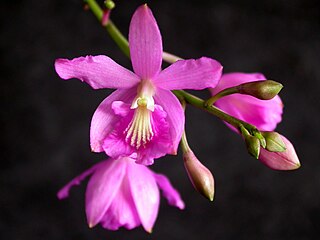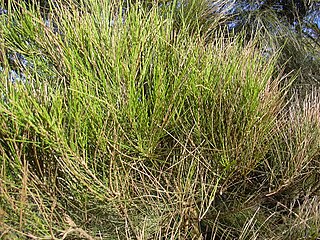
The Orchidaceae are a diverse and widespread family of flowering plants, with blooms that are often colourful and fragrant, commonly known as the orchid family.

The blue shark is a species of requiem shark, in the family Carcharhinidae, that inhabits deep waters in the world's temperate and tropical oceans. Averaging around 3.1 m (10 ft) and preferring cooler waters, the blue shark migrates long distances, such as from New England to South America. It is listed as Near Threatened by the IUCN.

Brassavola is a genus of 21 orchids. They were named in 1813 by the Scottish botanist Robert Brown. The name comes from the Italian nobleman and physician Antonio Musa Brassavola. This genus is abbreviated B. in trade journals.

Cattleya is a genus of orchids from Costa Rica south to Argentina. The genus is abbreviated C in trade journals.

Rhyncholaelia, abbreviated Rl. in the horticultural trade, is a genus of orchids, comprising two species. They are distributed in Mexico, Guatemala, Belize, and Honduras. Both species were originally published in Brassavola by Lindley. In 1918, Schlechter erected the new genus Rhyncholaelia and moved Brassavola digbyanaLindl. 1846 and Brassavola glaucaLindl. 1839 into it.

Brassolaeliocattleya, abbreviated Blc. in the horticultural trade, is the orchid nothogenus for intergeneric hybrid greges containing at least one ancestor species from each of the three ancestral genera BrassavolaR.Br., CattleyaLindl. and Laelia Lindl., and from no other genera.

Potinara, abbreviated Pot in the horticultural trade, is the nothogenus comprising those intergeneric hybrids of orchids which have Brassavola, Cattleya, Laelia and Sophronitis as parent genera.

Laeliinae is a Neotropical subtribe including 40 orchid genera, such as Brassavola, Laelia and Cattleya. The genus Epidendrum is the largest within this subtribe, containing about 1500 species. This is followed by the genus Encyclia, with over 120 species.

Pseudolaelia is a small genus belonging to the orchid family (Orchidaceae), the entire genus endemic to Brazil. The abbreviation used in the horticultural trade is Pdla.

Uphill Cliff is a 19.8 hectare biological Site of Special Scientific Interest near the village of Uphill, North Somerset, although it is in the Avon Area of Search used by English Nature which is based on the 1974-1996 county system.

Casuarina glauca, commonly known as the swamp she-oak, swamp oak, grey oak, or river oak, is a species of Casuarina native to the east coast of Australia. It is found from central Queensland south to southern New South Wales. It has become naturalised in the Everglades in Florida where it is considered a weed.
José Antonio Molina Rositto, usually known as Antonio Molina, was a Honduran botanist and Professor emeritus at the Zamorano Pan-American School of Agriculture. The standard author abbreviation Ant.Molina is used to indicate this person as the author when citing a botanical name.

Dichaea glauca is a species of orchid.
S. imbricata may refer to:

Rhyncholaeliocattleya, abbreviated Rlc. in the horticultural trade, is the orchid nothogenus for intergeneric hybrid greges containing at least one ancestor species from each of the two ancestral genera RhyncholaeliaSchltr. and CattleyaLindl., and from no other genera.
S. grandiflora may refer to:
Grevillea glauca, commonly known as bushman's clothes peg, cobblers peg tree or the beefwood tree, is a shrub or small tree that is native to Papua New Guinea and north-eastern Queensland, Australia. It usually grows to a height of between 2 and 10 metres and has leaves that are 6 to 20 cm long and 1 to 6.5 cm wide. Flowers are cream or greenish white and appear between April and August in the species' native range. These are followed by rounded follicles that are 2.4 to 4 cm long.

Rhyncholaelia digbyana is a species of orchid occurring from Honduras to Belize, Guatemala, Mexico and Costa Rica.

Petrophile glauca is a species of flowering plant in the family Proteaceae and is endemic to southwestern Western Australia. It is a shrub with pinnately-divided, flattened, glaucous leaves and more or less spherical heads of hairy yellow to creamy-white flowers.















